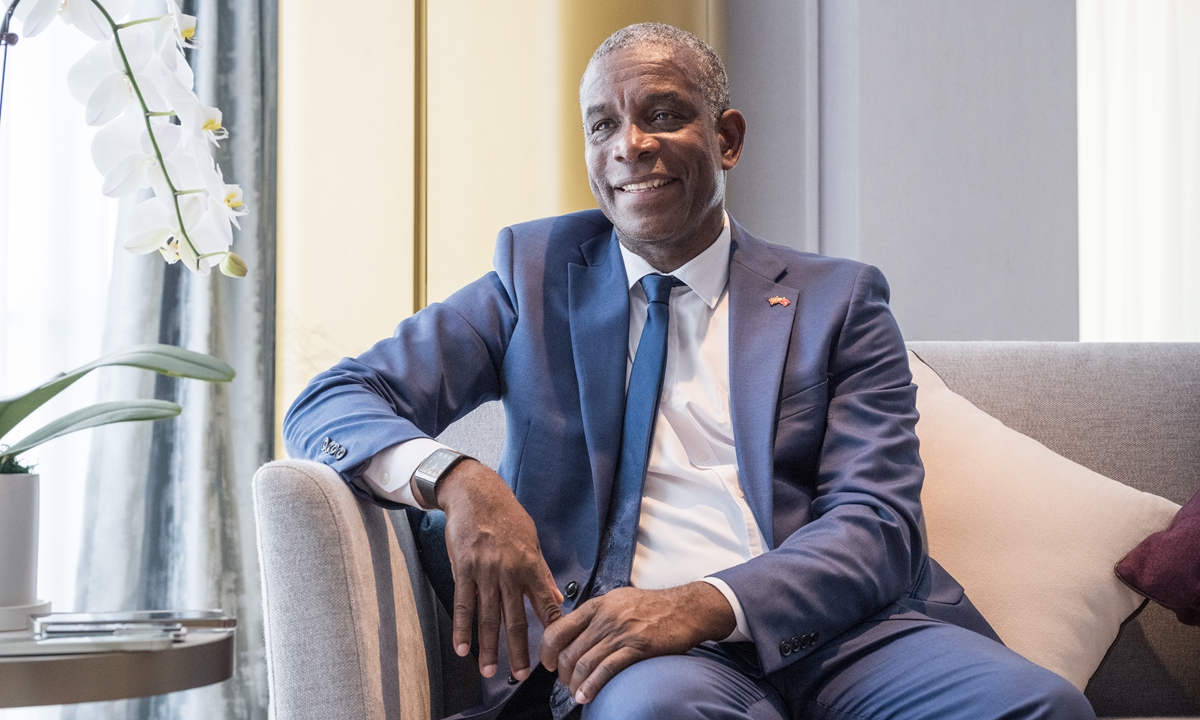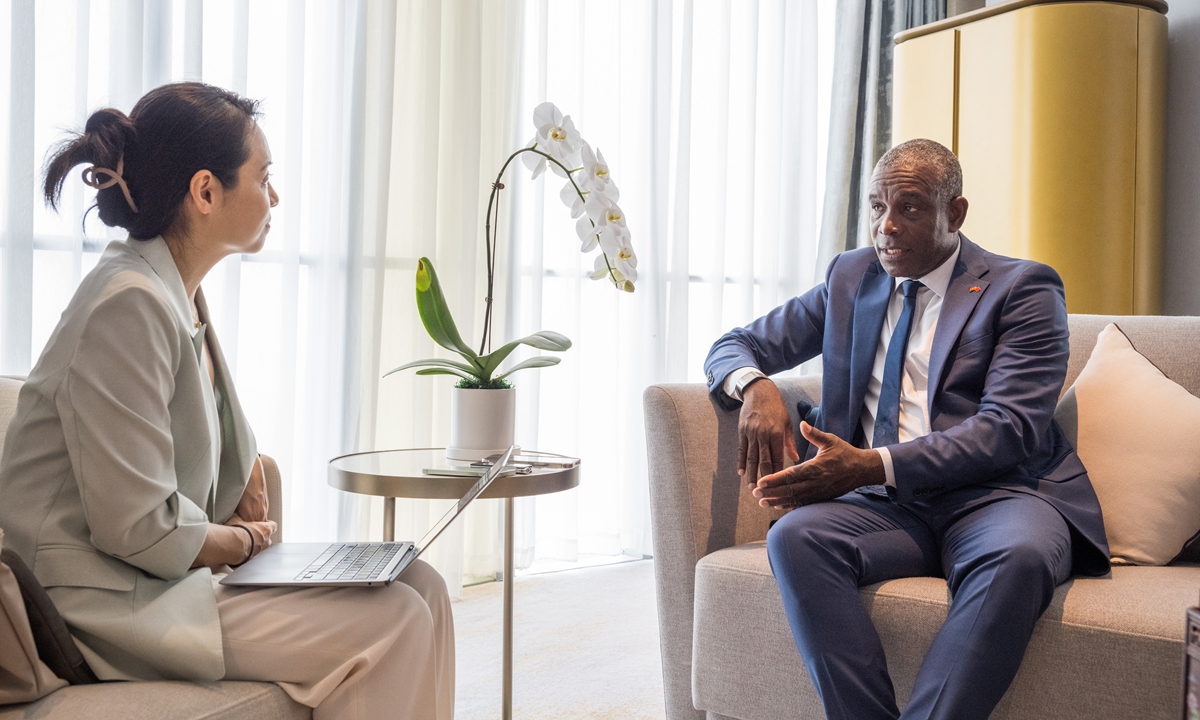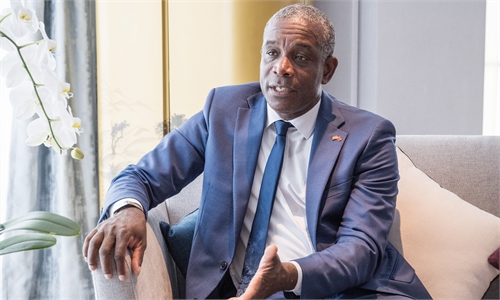Exclusive: GSI, GDI and other initiatives proposed by Xi based on equality, mutual respect for seeking joint solutions to common problems: Grenadian Foreign Minister

Foreign Minister of Grenada Joseph Andall speaks with the Global Times reporter in Beijing. Photo: Chen Tao/GT
Editor's Note:
Chinese Foreign Minister Wang Yi met with Foreign Minister of Grenada Joseph Andall in Beijing on Wednesday. The Chinese diplomat said China highly appreciates Grenada's adherence to the one-China principle, and supports Grenada in exploring a development path suited to its national conditions. China and Grenada signed the Memorandum of Understanding on joint construction of the Belt and Road Initiative (BRI) in 2018, opening a new chapter for cooperation in various fields. The Global Times reporter Chen Qingqing (GT) exclusively interviewed Andall in Beijing after the meeting, talking about China-Grenada relations, the cooperation under the BRI and the Global Development Initiative, Global Security Initiative and Global Civilization Initiative proposed by Chinese President Xi Jinping.
GT: On January 20, 2005, China and Grenada signed a joint communique on the restoration of diplomatic relations, officially resuming ties. How do you evaluate the development of China-Grenada relations? In your opinion, how has the cooperation between China and Grenada driven and promoted the relationship between China and the entire Caribbean?
Andall: Regarding the restoration of diplomatic ties between Grenada and China in 2005, that was the writing of an historic era. Grenada is now firmly entrenched in the idea of the one-China principle. China is one in the visible state. We respect the territorial integrity and the sovereignty of China.
The bilateral relations have become stronger over the years. One good thing about it is that even when we have a change in government, the policy remains the same. We continue to go along that path. In the Caribbean, the vast majority of CARICOM countries have diplomatic relations with the People's Republic of China. There are a few others who have not yet come on board, but we're confident that will change soon.
GT: The one-China principle is universally recognized by the international community and is supported by the vast majority of countries worldwide. Recently, we have noticed that an increasing number of Central American countries support the one-China principle and choose to sever their so-called diplomatic relations with Taiwan regional authorities. How do you view this trend?
Andall: This is in keeping with the inevitable march of history. As I said, in my remarks, in my meeting with [Chinese] Foreign Minister Wang Yi this morning (September 6), resisting the one-China principle is like trying to push back a tsunami with your hands. This is an irreversible trend.

Foreign Minister of Grenada Joseph Andall speaks with the Global Times reporter in Beijing. Photo: Chen Tao/GT
GT: This year marks the 10th anniversary of President Xi Jinping's Belt and Road Initiative proposal. China and Grenada signed a memorandum of understanding on the Belt and Road cooperation in 2018. What significant achievements do you think China and Grenada have made? What changes has BRI brought to Grenada?
Andall: The BRI is one that seeks to bring the world closer together. It's part of China's policy on South-South cooperation. We have been able to benefit from that collaboration through the improvement of our infrastructure, expansion and modernization of our airport and road network.
It is quite significant as countries of the global south seek to develop and improve their physical and material well-being.
For example, our international airport is being upgraded in terms of technology and physical infrastructure. We also have our road network, which is also benefiting from the input of the BRI. We are also looking at other areas in the coming months and years from which Grenada can also draw some benefits.
GT: How would you evaluate the achievements of China and the Caribbean countries in the Belt and Road Initiative? What role do you think Grenada can play in future China-Caribbean Belt and Road cooperation?
Andall: What is significant about the BRI is that China, a country in the path of development, and although it has achieved quite a lot, has decided to be socially responsible by sharing its experiences and its resources with other countries of the global south.
As more and more countries embrace the one-China principle, it is obvious that the benefits of that of being part of that initiative will spread to all of the countries who are coming on board.
GT: With increasing global instability and uncertainty, humanity's pursuit of peace and security has become more urgent. The notion that security is a prerequisite for development has become a significant consensus globally, including Caribbean leaders. How does Grenada view China's Global Development Initiative (GDI), Global Security Initiative (GSI), and Global Civilization Initiative (GCI)? What significance do you believe these three initiatives hold for Grenada's development and security?
Andall: All of these initiatives, they start from the viewpoint that all states are equal, regardless of wealth, military might, size and power.
And if the world continues to operate from the principle of might is right, then it will be unstable and insecure for all, including the powerful ones. The significance of the GSI, GDI the other initiatives proposed by President Xi is that they start from the point of view of equality, mutual respect for seeking joint solutions to common problems.
No one country can do it all by itself. Anyone who thinks that it can be done by one big power is delusional.
It is a sensible way of [seeing the world order]. Because there cannot be security for one, unless there is security for all. One's security must not come at the expense of others.
GT: As you have long been involved in the field of education, and your alma mater, T.A. Marryshow Community College, has established a Confucius Institute. This institute has become an essential platform for cultural exchanges and connecting hearts between China and Grenada. What recommendations do you have for the development of this Confucius Institute? What are your thoughts and suggestions on cultural exchange and cooperation between China and Grenada?
Andall: One of the key things toward achieving global understanding, global peace and global justice is cultural exchanges. When you learn other languages, when you learn about other people's way of life, it makes it easier to develop a relationship of trust and mutual respect. And that, in turn, will translate into understanding peace and justice.
The establishment of the Confucius Institute at T.A. Marryshow Community College has gone a long way toward cementing the bonds of friendship between the peoples of China and Grenada.
If I had to make one recommendation, I would say that if it is possible, it might be good to have more of a presence in some of the rural communities in Grenada.
Talking about rural communities, one of the hallmarks of my visit to China has been the signing of a letter of intent between the village of yellow mud in Shandong Province and the village of red mud in my parish, Saint Patrick, Grenada. We believe that agreements or engagements like this one will go a very long way toward bridging the cultural gap and creating greater understanding among peoples of the world.
We've had dozens of Grenadians who have benefited from being able to study in different universities and colleges in China. But we believe that a true partnership should involve two-way traffic. Therefore, this is something worthy of pursuing that Chinese students, Chinese people may have the opportunity to go to Grenada, to study or do research there.
In fact, when we visited Ocean University earlier this week, one of the ideas that came up was a possibility of having students and researchers from Ocean University go to Grenada to do some studies, marine related research and projects. So that is something that will be explored.
GT: In which areas will China and Grenada have broad prospects for cooperation in the future? In the fields of trade and cultural exchanges, what new breakthroughs do you hope to see?
Andall: During this trip, we have also discussed the plans and possibilities for having exchanges in the field of tourism, the performing and visual arts, where artists from China can go to display their wares and the talents in Grenada. And Grenadians can have the opportunity to come here to perform, to display art and to let the Chinese people see what we have to offer on the cultural front.
Grenada is quite open to business. We have spoken about a possibility of joint ventures with Chinese businesses, setting up assembly, plants or factories in Grenada. The future looks bright.
I must mention that our biggest cultural festival is carnival, which takes place from July to August every year culminating on the second Monday and Tuesday of August. This year, we were extremely delighted to see that [Chinese] Ambassador [to Grenada] and members of the staff of the Chinese embassy and other members of the Chinese community in greater did participate in our carnival. And it was very well received by the local population.
These are the kinds of actions that help to cement the friendship between nations. We look forward to this relationship, growing from strength to strength.
GT: How will the signing of the "United Nations Convention on the Recognition of Foreign Judicial Sales of Ships" further promote the development of Grenada's international shipping and trade?
Andall: Grenada is an island state, and we are several times bigger in terms of our marine space than in terms of our land space. Apart from the fisheries, though, we do not have a very strong tradition in the maritime field.
This is an opportunity for us to learn more about the intricacies, and to see how we can derive some benefits from it, as well as contribute to the whole global maritime industry and environment.


